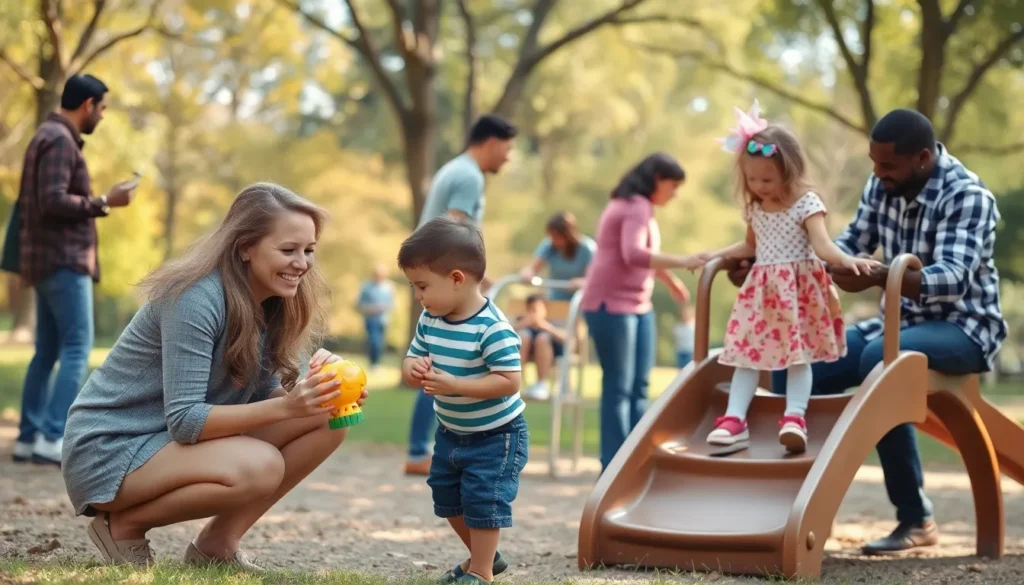Table of Contents
ToggleParenting isn’t just a job; it’s a wild roller coaster ride complete with unexpected twists and turns. One moment, they’re adorably giggling, and the next, they’re staging a full-blown protest over broccoli. Adjusting to this new reality can feel like trying to solve a Rubik’s Cube while blindfolded. But fear not—every parent has been there, and the good news is that it gets easier.
Understanding Parenting Adjustment
Parenting adjustment refers to how caregivers adapt to the demands of parenting. This adjustment process encompasses emotional, physical, and social challenges faced throughout child-rearing.
Definition of Parenting Adjustment
Parenting adjustment involves acclimating to the new roles and responsibilities that come with raising children. It includes managing stress levels and emotional responses to changing situations. Caregivers often experience a shift in priorities, balancing their own needs with those of their child. New routines and expectations emerge, requiring flexibility. Adjustments might also entail developing parenting skills and gaining insights into child behavior. Each family’s adjustment journey can differ significantly based on their circumstances.
Importance in Child Development
Adjusting to parenting significantly influences child development. A stable environment fosters a sense of security, enhancing emotional well-being in children. Engaged parents positively impact children’s social skills and cognitive growth. When caregivers manage stress effectively, they model healthy coping strategies for their children. Consistent support from parents facilitates better communication and strengthens bonds. Children benefit from these adjustments, showcasing increased resilience and adaptability as they grow.
Factors Influencing Parenting Adjustment


Parenting adjustment is influenced by various factors that shape how caregivers adapt to their roles.
Emotional Factors
Emotional stability plays a significant role in parenting adjustment. Parents often face feelings of anxiety or frustration that affect their interactions with children. Managing these emotions can lead to more effective parenting practices. Those who prioritize emotional health create a supportive environment that promotes healthy child development. Parents reflecting on their emotional well-being tend to model resilience, helping children develop coping skills. Furthermore, accessing mental health resources or support groups boosts emotional adjustment, allowing parents to connect with others who understand their challenges.
Social Support
Social support significantly impacts the adjustment process for parents. Engaging with friends, family, and parenting groups helps reduce feelings of isolation. A strong support network offers practical assistance and emotional encouragement, which are vital during challenging times. Parents benefiting from social connections often experience lower stress levels and better overall well-being. This support also enhances their ability to manage parenting demands effectively. Encouraging open communication within these networks fosters friendships and built-in strategies for coping with parenting challenges.
Economic Considerations
Economic factors also play a crucial role in parenting adjustment. Financial stability directly influences the resources available for child care, education, and recreational activities. Those facing economic hardships may experience increased stress, affecting their parenting style. Parents with access to financial support or community resources often manage these challenges more effectively. Budget-friendly parenting solutions, such as shared child care or community programs, can alleviate financial burdens. Accessing government assistance programs or local initiatives further supports families in navigating economic difficulties, enhancing parenting adjustment overall.
Strategies for Effective Parenting Adjustment
Navigating the challenges of parenting adjustment requires practical strategies for success. Effective communication, self-care, and seeking professional help are vital components for parents aiming to foster a nurturing environment.
Communication Techniques
Open communication strengthens relationships within families. Practicing active listening allows parents to understand their children’s needs better. Encouraging children to express their feelings helps build their emotional intelligence. Utilizing “I” statements fosters a non-confrontational approach during discussions. Setting aside time for family meetings creates a space for everyone to share thoughts and concerns. Clear expectations minimize misunderstandings, enhancing overall family dynamics.
Self-Care Practices
Self-care plays a crucial role in effective parenting. Prioritizing personal well-being enables parents to manage stress better. Engaging in regular physical activity, even short walks, boosts mood and energy levels. Mindfulness exercises, such as meditation or deep breathing, promote emotional clarity and resilience. Allocating time for hobbies helps rejuvenate the mind and spirit. Connecting with friends or participating in support groups provides a sense of community and shared experience.
Seeking Professional Help
Professional help can significantly aid parenting adjustment. Therapy or counseling offers parents tools to manage stress and improve coping strategies. Group therapy facilitates shared experiences, enhancing support networks. Parenting workshops educate parents on effective techniques and approaches. Consulting pediatricians or child psychologists addresses developmental concerns and provides expert guidance. Utilizing available resources maximizes the potential for a harmonious family life.
Impact of Parenting Adjustment on Family Dynamics
Parenting adjustment significantly influences family dynamics, affecting interactions and relationships within the household. Emotional health directly impacts the parent-child relationship. When a parent manages stress effectively, it fosters a nurturing atmosphere. A stable environment enhances communication, encouraging open dialogue and emotional support. Children in positive atmospheres display improved social skills and emotional awareness.
Sibling interactions also shift as parents navigate adjustments. Balanced parenting allows siblings to bond more deeply. These connections thrive in environments where parents promote cooperation and shared experiences. When parents encourage teamwork in tasks, siblings learn to support each other. Engaged parenting builds a foundation for conflict resolution among siblings, leading to healthier relationships over time.
Through positive parenting adjustments, families experience profound changes that strengthen both parent-child and sibling relationships.







